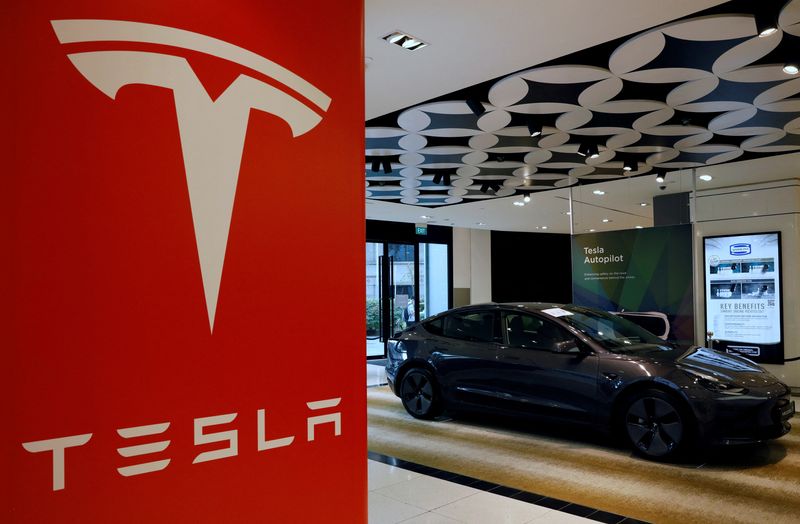By Hyunjoo Jin
SAN FRANCISCO (Reuters) -As recently as July, Tesla (NASDAQ:TSLA) Chief Executive Elon Musk said the electric-car maker did not have a problem with customer demand, simply a problem making and shipping all the Model Ys and Model 3s consumers were ready to buy.
That may no longer be true.
Analysts see early signs of caution for the world's most valuable car maker, including for its increasingly premium pricing, at a time when the global economy is slowing and expectations for global auto sales are being dialed back.
Tesla has navigated supply-chain challenges better than most of its rivals and analysts expect it to post strong growth through next year as it expands output, but there are also indications it is being forced to respond to a tougher market.
The most immediate concern: Tesla made over 22,000 more EVs than it delivered to customers in the third quarter, data released this week showed. That is the first time it has had to finance that many cars in inventory.
For most of the past three years, Tesla has been selling more EVs in a quarter than it can produce. The one notable exception was in early 2020 when COVID disrupted deliveries.
While Tesla's numbers remain low, building inventory has historically been a down-cycle indicator for automakers, forcing markdowns in past recessions of the kind Tesla has not yet faced.
Tesla blamed transport issues for a delivery total that fell short of Wall Street expectations.
If Tesla needs to hold more inventory in coming quarters to smooth deliveries and avoid the end-of-quarter rush that has been its norm, that would add to the $1.2-billion in undelivered cars it held at the end of the second quarter.
Analysts believe Tesla still has more demand than it can supply, the bedrock assumption behind its aggressive expansion plan over the next year as it ramps up production at factories in Shanghai, Berlin and Austin, Texas.
Morgan Stanley (NYSE:MS) analyst Adam Jonas said he believed Tesla did not face an immediate demand problem, but added a caution on pricing and Tesla's ability to buck the economic cycle.
"It would be unreasonable to assume that there is: (a) a limit to how much Tesla can continue to increase prices without demand suffering and (b) that the company was not exposed to decelerating macroeconomic growth,” he said in a research note.
Tesla's average vehicle transaction price jumped 31% to $69,831 in August, compared with $53,132 at the start of 2021, according to Kelly Blue Book. That outpaced industry-wide price hikes on new cars of 18% to $48,301 during the same period.
The waiting time Tesla customers face between order and delivery has also been dropping in both the United States and China, Tesla's largest markets. In China, that lag, one indicator of the supply-demand balance, has been cut four times since August to a minimum of a week for delivery.
And Tesla, which has resisted marketing and incentives, offered Chinese buyers a rebate of 8,000 yuan ($1,100) if they took delivery before the end of September.
Musk himself in July said Tesla prices were hitting "embarrassing levels" and that "demand falls off a cliff" when prices are rising to "some arbitrarily high level."
As Tesla pushes its own capacity expansion, it is running into a wave of new EV competition, especially in China from the likes of BYD, Nio (NYSE:NIO) and Xpeng (NYSE:XPEV).
A Tesla output plan reported last week by Reuters, before the third quarter delivery announcement, showed the automaker’s detailed plan to run and source its factories to hit output growth of 50% this year and next, a target just beyond the most bullish outside forecasts.
The question of whether and how Tesla sees the supply-demand balance shifting will be central for investors when the company reports quarterly results on Oct 19.
Musk has offered an evolving view on economic risks. In June, he told Tesla staff he had a "super bad feeling" about the economy, a reason he cited to pause hiring at the time. In August, he told investors he expected a "mild recession" that could last up to 18 months.
Guidehouse Insights analyst Sam Abuelsamid said Tesla needed to get higher production from its newer factories in Austin and Berlin. Musk had earlier compared the start of production in those plants to "gigantic money furnaces."

"Tesla could end up running into some financial challenges in the third and fourth quarters (of 2023), if those factories continue to be underutilized," Abuelsamid said.
Fitch Solutions, which provides research on country risk and industries, said on Tuesday it expected global auto sales to drop 5.4% in 2022, before bouncing back only partly in 2023.